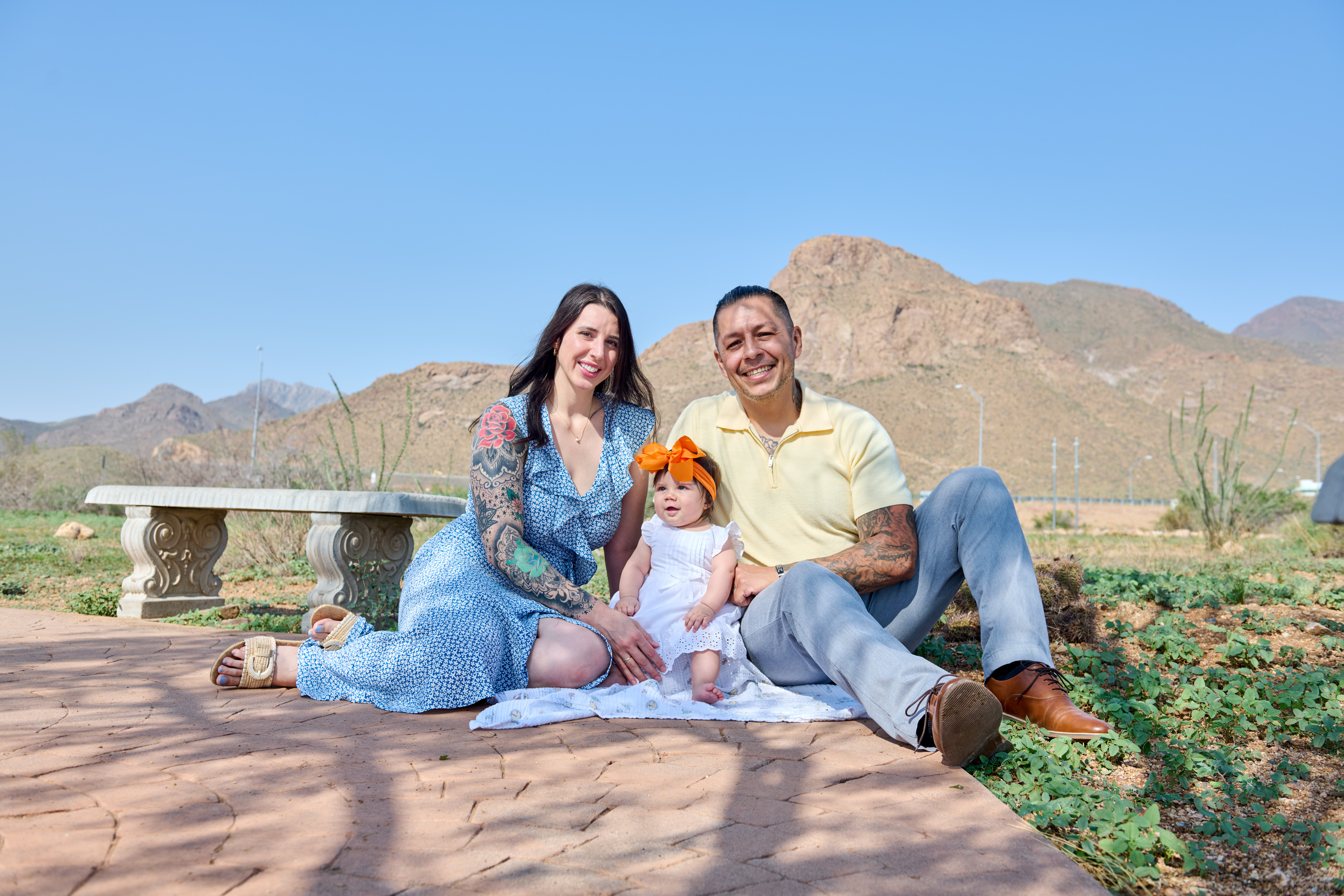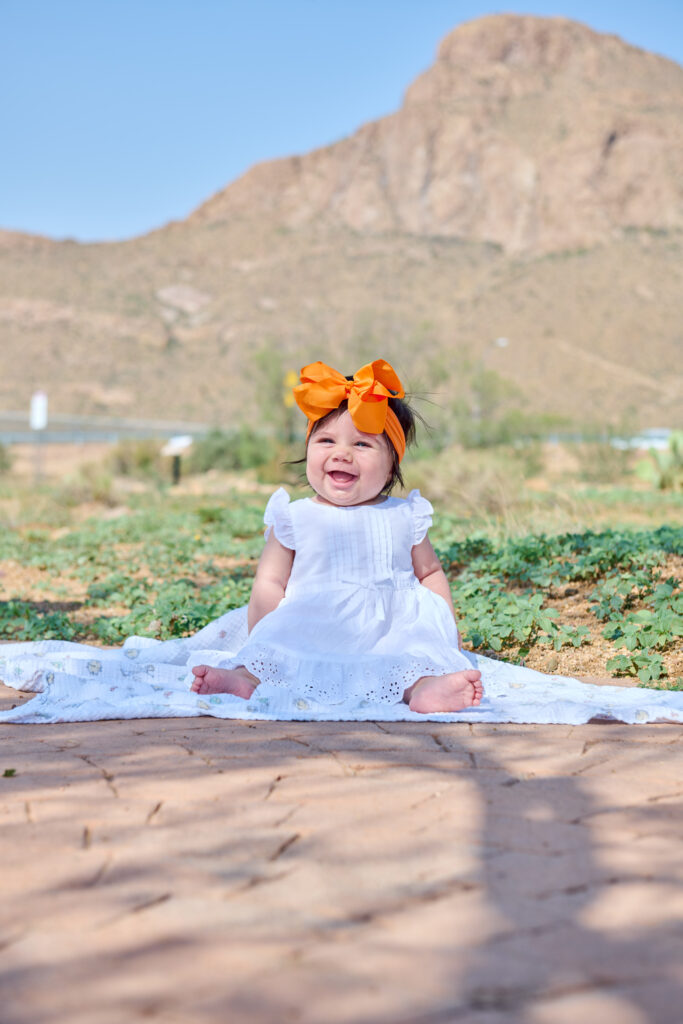Tiny heart, big fight: Medical team saves baby born with heart defect

The small plane was loud, packed with monitors and medical gear. Lauren Casillas never left her newborn daughter’s side, watching her closely and counting each breath.
As a nurse, Lauren knew just how critical the moment was. Lucille — only 2 weeks old — was being flown more than 600 miles from El Paso to Driscoll Children’s Hospital in Corpus Christi. Lauren didn’t know what would happen when they landed, only that there was no time to lose.
“That night felt like a black hole,” she said. “Everything was moving so fast. I didn’t know if she would even make it to the hospital.”
Her daughter was small, but strong — “very purposely created,” as Lauren described — and given a name that comes from the Latin word for “light.”
Into the darkness
Only hours earlier, Lauren and her husband, Jose, had been holding their newborn daughter in their arms at home in El Paso, still celebrating her perfect arrival.
“Everything was perfect,” Lauren explained. “Her anatomy scan showed a perfect, healthy baby.”
She came into the world with ease. “Beautiful, natural birth. No complications whatsoever,” Jose added. “We were out of the hospital within 25 hours. She was thriving. Feeding. Sleeping. Doing everything a baby should.”

But on Feb.1, their world shifted. “She seemed a little more tired than usual, a little more floppy,” Lauren said. “We thought maybe she was just tired. Then she vomited. When we tried feeding her again, she turned blue.”
“I knew I had to keep her stimulated and crying,” said Jose, drawing on his Army training while Lauren relied on her medical experience, too, staying calm and focused on the phone with 911.
Paramedics rushed Lucille to the hospital, where she was intubated and admitted to the NICU.
Doctors worked through possibilities — RSV, or another infection — until they brought in Dr. Srinivasarao Badugu of Driscoll Children’s Pediatric Cardiology Clinic in El Paso. Within an hour, he had a diagnosis: coarctation of the aorta.
But it would turn out Lucille had more than one heart defect.
Dr. Mary Porisch, director of Interventional Cardiology at Driscoll Children’s Hospital in Corpus Christi, received the call that night.
“She had both the whole upper part of the aortic arch too small and a very severe narrowing... not allowing good blood flow to the lower half of her body,” Dr. Porisch explained. “She could have had a cardiac arrest and not be able to be resuscitated with the situation in the way that it was.”
Back in the NICU, Dr. Badugu delivered more than just the diagnosis. “He let us know that our insurance might try to send us other places... but he was very adamant that he was going to fight for us to come to Driscoll,” Jose said.
And fight he did. Lauren and baby Lucille were soon in the air, aboard the Driscoll transport plane. Jose flew separately and arrived just before the transport team.
“Once we parted ways, and I was no longer with them, I couldn’t keep it together,” Jose explained. “I was a big ball of mess the entire way here by myself.”

The right care at the right moment
At Driscoll, the response was immediate.
“There had to be 12 people in that room waiting to receive Lucille,” Lauren remembered. “I’ve never seen something like this before. Even as a nurse who has worked traumas, I’ve never seen that many people in a room waiting for a patient.”
Lucille was stabilized with prostin, a medication critical to keeping her ductus arteriosus open — a vessel that helps compensate for heart defects in newborns.
The days that followed were filled with assessments and images, revealing the full scope of Lucille’s heart issues: coarctation of the aorta, a ventricular septal defect (VSD), an atrial septal defect (ASD) and a hypoplastic aortic arch.
“The next step was surgery,” Lauren said. “It was almost like all day, every day, preparation for surgery. The education, the emotional preparation — what it was going to look like, feel like, for her and for us.”
The night before the operation, Dr. Stephen Langley, chief of Pediatric Cardiac Surgery and Medical Director of the Heart Center at Driscoll, met with the family explaining the complexity of the surgery.
“This operation involves opening the chest through the front, connecting Lucille to the heart-lung machine, and stopping her heart for about 45 minutes,” he said. “She only had blood going to her head during that time. There was no blood going anywhere else.”
The risks were high. Lucille had already been in “extremis,” Dr. Langley said. “That means you’re in a very life-threatening situation that if something doesn’t happen within a few minutes or a few hours, you’re going to die.”
Into the light
Little Lucille’s surgery lasted six hours.
It was another “black hole” moment for the Casillas that’s difficult to fully process even today. As the moments ticked by, their baby hovered between two outcomes, her life no longer in their hands.
Jose held back tears as he described watching his daughter open her eyes after Dr. Langley and team healed her tiny heart:
“We knew she recognized us. Our baby was there.”
“She had so many tubes coming out of her,” Lauren added. “You look at your baby and they are just a ball of lines.”
But she was alive.
And the operation went as well as anyone could have hoped. Perfect, in fact.
“There is no narrowing in the aorta, and there is no residual hole in her heart,” explained Dr. Langley. “All the valves in her heart are functioning perfectly.”

Let it shine
Lucille was discharged just nine days after her surgery.
“Because of Driscoll Children’s Hospital, we are able to go home as a family,” Lauren said. “Our boys will still have a sister. We will still have our daughter.”
Lucille will continue to be monitored as she grows. “Weekly appointments — hopefully monthly, then every other month,” Lauren said. “But she should live a pretty happy, normal, healthy life.”
What stands out most to the Casillas family isn’t just the surgery — it’s the people.
“Usually you go to a hospital and remember that one great nurse,” Lauren said. “But here, every single nurse was just the best nurse ever.”
Jose agreed. “The nurses became very close with us,” he said. “They advocated with us, for us, for our daughter.”
Two weeks after her birth, Lucille’s life nearly slipped away. Now, she’s home in El Paso — her heart repaired, her world getting bigger by the day. She’s a little sister, a pink-loving baby girl, already full of personality.
“I don’t think most people have to hold their kid and be grateful that they’re still here,” Lauren said. “But we almost lost her.”
Lucille, their little “light”, remained the steady glow in the darkest moments.
“Driscoll saved her. Period. End of story,” Jose said. “And they didn’t just save her life. They gave her a pretty promising one.”
With plenty of time to shine bright.